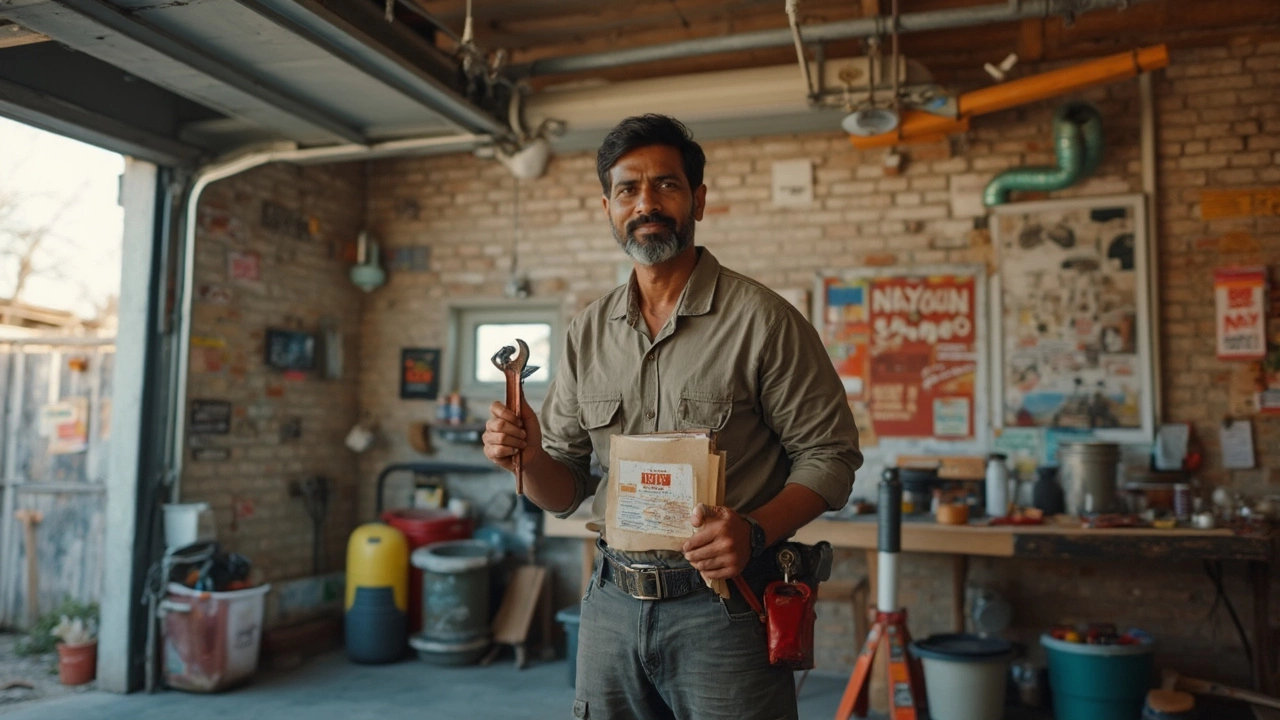Can You Really Become a Self-Taught Plumber?
Thinking about fixing leaky faucets and clogged toilets all by yourself? You're in good company. Many folks are considering the option of becoming a self-taught plumber these days. Why? Well, it's not just about saving money; there's a huge sense of accomplishment in fixing things on your own.
But before you start tearing apart your bathroom, you need to know some basics. First off, having the right tools is key. A decent set of plumbing tools might be an upfront investment, but they pay off in saved headaches. Wrenches of different sizes, pipe cutters, and a quality plunger are a good start.
The next big question is how you actually learn plumbing. Books and online tutorials can be a goldmine if you find the right ones. They provide a solid understanding of plumbing concepts. But remember, watching videos isn't the same as holding a pipe under your sink at 2 AM.
- Why Learn Plumbing on Your Own?
- Essential Tools You Need
- Learning Methods that Work
- Common Challenges and How to Overcome Them
- Real Stories from Self-Taught Plumbers
- When to Call a Professional
Why Learn Plumbing on Your Own?
You might be wondering why anyone would choose to become a self-taught plumber when there are plenty of professional courses out there. Well, for starters, there's a significant cost advantage. Plumbing courses can cost you an arm and a leg, whereas learning on your own is way cheaper. Plus, the skills you pick up can save you loads of cash on minor repairs around the house.
What's more, learning plumbing at your own pace means total flexibility. Got a busy schedule with work or kids, like my Gareth? No problem! You can fit in some practice whenever you have the time. Whether it's late-night YouTube sessions or squeezing in quick repairs over the weekend, you call the shots.
There's also a sense of independence you get from handling your own fixes. Imagine this: a small plumbing issue pops up in your home. Instead of calling and waiting for a pro, you grab your tools and take care of it yourself. Not only is it satisfying, but it also cuts down on wait times and avoids those hefty call-out fees.
Let’s not forget the sense of empowerment and skill-building. Once you've tackled a few problems, you'll feel more capable and confident in handling future issues. This confidence can extend beyond plumbing, making you more resourceful in tackling other DIY projects.
Finally, if you're thinking about a career switch or side hustle, teaching yourself plumbing can lay a solid foundation. Many successful plumbers started by rolling up their sleeves and diving into the world of pipes and fittings on their own terms. So, why not try your hand at it?
If you're the type who likes a challenge and enjoys fixing things, going the DIY route could be a perfect fit. With persistence and a bit of grit, you can gradually build up your plumbing skills and handle just about anything your pipes throw at you.
Essential Tools You Need
Before you get your hands dirty trying to be a self-taught plumber, it’s crucial to have the right tools in your arsenal. Having these handy can make all the difference between a successful repair and a flooded bathroom floor. Let’s dive into the must-haves for any aspiring DIY plumber.
First up, the trusty wrench. You'll need a couple of types here:
- Adjustable Wrench: This is your best friend for all sorts of pipes and fittings. You'll want one that's durable and comfortable to hold.
- Pipe Wrench: Essential for gripping round objects like pipes. These are the big guys that give you the leverage you need.
Next, consider pipe cutters. A quality pipe cutter is indispensable when it comes to making clean cuts through copper piping. Hacksaws can work as a backup, but you’ll love the precision of pipe cutters.
Plungers should be a staple in your collection. But not all plungers are created equal. For toilets, you’ll need a flange plunger, which is specifically designed to fit snugly into the bowl’s drain.
Don’t forget about the auger (a.k.a. the “drain snake”). This little beauty reaches and removes blockages that plungers can’t handle.
Finally, let's talk sealing. Plumber’s tape (or Teflon tape) is a must for sealing pipe threads. It prevents leaks and is super easy to apply.
Consider this tool inventory as your plumbing starter pack. As you grow more confident and take on bigger projects, you can expand your toolkit. Remember, well-equipped means well-prepared, and that’s half the battle won in the world of plumbing!
Learning Methods that Work
Getting into the nitty-gritty of plumbing can seem overwhelming at first, but there are some pretty effective ways to kickstart your journey as a self-taught plumber. Unlike many trades, where you need formal education, plumbing offers a bit more flexibility for the DIY enthusiast. Let's break down some methods that really work.
First up, the old-school books and manuals route. While some might think they're outdated, many comprehensive guides are still packed with valuable information. Look for ones that cover everything from basic repairs to advanced systems. These resources can often be found at your local library or purchased online.
Next, don't underestimate the power of online tutorials and courses. There are countless free and paid video tutorials out there. Websites like YouTube are loaded with content from professionals walking you through both simple and complex projects. Try to choose content that’s recent, so you're learning the latest techniques and code requirements.
Another really effective method is hands-on practice. Theory is great, but practice makes perfect. Start with small, safe projects like fixing leaky taps or replacing a showerhead. You'll get a feel for the tools and understand how various components fit together. Plus, it builds confidence.
- Get involved in community projects. Many local communities have initiatives or events where you can practice your skills under supervision. It’s a win-win: you gain experience, and someone else benefits from your work.
- Connect with local plumbers. Some pros are happy to offer a bit of mentorship. A brew can go a long way when asking for advice, and it's a great way to understand real-world applications.
Finally, if you're serious about diving deeper, consider a formal online course with certification. They're relatively affordable and add a bit of credibility to your skills, especially if you’re looking to branch into professional work later on.
So, whether you’re sticking to YouTube or picking up a few formal certifications along the way, the key is consistent practice and persistence. Embrace mistakes as learning tools. After all, that's part of the journey to becoming a confident self-taught plumber.

Common Challenges and How to Overcome Them
Diving into the world of self-taught plumbing can throw some curveballs your way. One major hurdle is dealing with unexpected problems. You start fixing a minor leak, only to discover the entire fitting's corroded. In such scenarios, patience is your best friend. Take a deep breath, assess further damage, and decide if you need to replace more parts. It's all part of the learning curve.
Another challenge is the sheer amount of information available. It's easy to get overwhelmed with online tutorials and books, each offering different advice. To avoid getting lost, start with basic projects and gradually move on to complex ones. Small, manageable steps help build confidence and competence.
Many self-taught enthusiasts also face the obstacle of time. Balancing learning with work can be tough. Carve out dedicated slots in your schedule to practice. Consistency beats cramming every time.
- Understanding Regulations: Plumbing often involves strict regulations. Knowing your local codes is vital. Research your area's rules online or contact local authorities.
- Safety Concerns: Working with water and pipes means you occasionally deal with electricity and heating. Double-check that you turn off relevant supplies before starting a project. Safety should always come first.
- Tool Usage: Handling new tools can be intimidating. Don’t rush; read manuals or watch specific tool tutorials. Knowing how each tool works prevents damage to both the tool and your plumbing system.
If you hit a brick wall, don't hesitate to ask for help. Online forums or local plumbing communities can offer advice and tips from more experienced hands. Sometimes connecting with others is all you need to solve a tricky issue.
Consider tracking your progress, perhaps in a small journal. Jot down what you learned, what worked, and what didn't. This way, you're not just solving problems; you're also growing your skill set as you tackle plumbing challenges.
Real Stories from Self-Taught Plumbers
Let's jump into the real world of self-taught plumbers. You'll find their stories relatable, maybe even a little inspiring! Take John from Oregon, for example. John started when a simple leak in the bathroom kept him awake at night. Instead of waiting for a pro, he grabbed a wrench and watched a few YouTube videos. Fast forward a few months, and he's now the go-to fix-it guy in his neighborhood.
There's also Emily from Sydney. She was tired of hiring plumbers every time a pipe rattled. Armed with online courses and a hands-on approach, she began fixing things herself. A year in, Emily's skills got so good, she started offering her services part-time. She even got a side hustle from it!
A bunch of these self-taught folks talk about the challenges too. Mike from Auckland, for instance, mentions how he struggled with identifying pipe issues initially. He learned the hard way that not every problem has a one-size-fits-all solution. Knowing when to call a professional didn't just save his pipes; it saved his sanity!
Here's a quick peek at the most common fixes these self-taught pros tackle:
- Fixing leaks, the notorious ones that ruin your sleep.
- Unclogging drains, because they always clog at the worst possible time.
- Repairing toilets – less glamorous, but essential.
And honestly, who wouldn't love the satisfaction of fixing their own home issues? These stories show that whether you're in it to save money or gain a new skill, becoming a self-taught plumber is absolutely possible with dedication and the right tools.
When to Call a Professional
Okay, so you've dived into self-taught plumbing, but there are moments when even seasoned DIY enthusiasts know it's time to step back. Not every plumbing issue is a quick fix, and knowing when to call a professional can save you a world of trouble and possibly a flooded house.
First off, if you're dealing with plumbing work that touches the main water supply or gas lines, stop right there. Not only is it a safety hazard, but in many places, it's legally required to hire a licensed plumber for these tasks. Attempting these repairs without experience can lead to serious risks, including gas leaks or water damage.
Next, consider the complexity of the job. If your plumbing problem involves mysterious noises or persistent leaks that don't respond to typical fixes, it's probably time to bring in the pros. These issues often point to deeper problems within the plumbing system, and a professional has the know-how to diagnose and fix them properly.
You should also think about your time and stress levels. Some jobs, like completely replacing pipes or installing new plumbing systems, can take hours and can get pretty technical. You've got work, family, and a bunch of other commitments. Is it worth the hassle, or do you want to bring in someone who can get it done in a fraction of the time?
If you've attempted a self-taught plumbing fix and it's only gotten worse, it's crucial to step back. Patching a growing problem can turn a small repair into a major one, which might cost more in the long run. Remember that a professional plumber brings years of experience and troubleshooting skills to the table.
Here's the bottom line: knowing your limits is just as important as knowing your skills. A quick call to a professional might not just save you money and time; it might also save you from a huge mess. Plus, if they solve the problem, you get to learn from what they did. It's like a free plumbing lesson!





